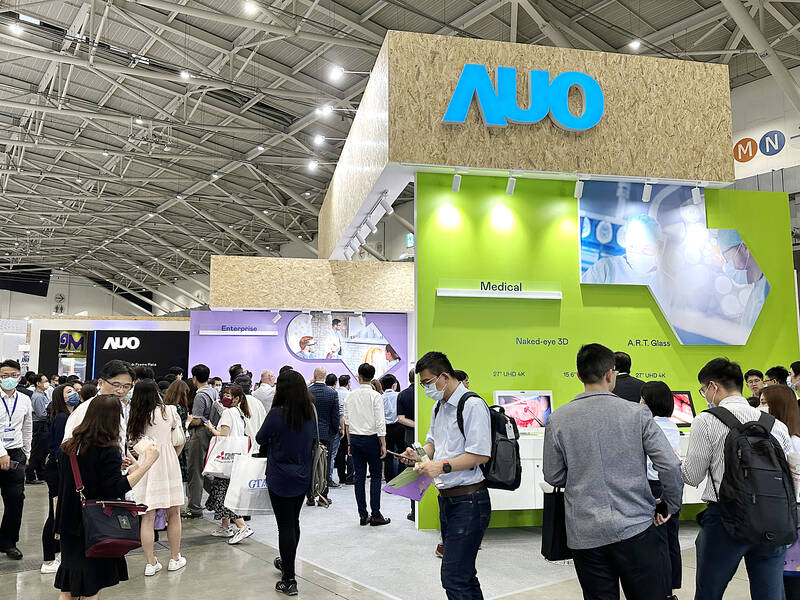Flat-panel maker AUO Corp (友達) yesterday said its losses in the first quarter of this year widened to NT$10.91 billion (US$355.3 million) due to sluggish demand for notebook computers from enterprise customers and unfavorable foreign exchange rates.
However, the company retained its growth outlook for the remainder of this year.
It was the fourth straight unprofitable quarter for the Hsinchu-based company, after registering a quarterly loss of NT$10.21 billion in the fourth quarter of last year.

Photo: Chen Mei-ying, Taipei Times
AUO blamed a foreign exchange loss of NT$1.1 billion and fewer solar module shipments for the worse-than-expected performance.
Losses in its display business improved NT$2.4 billion from the previous quarter, thanks to a pickup in panel demand for TVs, consumer PCs and consumer electronics, as panels approach supply-demand parity in the second quarter, AUO said.
Gross margin worsened to minus-9.5 percent, compared with minus-8.7 percent in the previous quarter, the company said.
“With panel supply-demand dynamics returning to a balance, prices of most panel products will stop stabilizing and even start to rebound. Therefore, we believe [revenue] will increase each quarter in the remainder of this year,” AUO chairman Paul Peng (彭浪) told an online investors’ conference.
“The second quarter will be better than the first quarter,” Peng said. “The second half will be better than the first half, based on the messages from our customers.”
The company expects a seasonal uptick in the second half, Peng said.
AUO said it has begun seeing inventory buildup demand from Chinese customers ahead of the nation’s 618 shopping festival in June, and expects the year-end holiday season in the US and Europe to further fuel panel demand in the second half.
As Chinese consumers remain conservative about spending after the COVID-19 restrictions were lifted at the beginning of this year, AUO said it is closely monitoring their spending behavior.
This quarter, shipments of TV and PC panels are expected to rise about 20 percent quarter-on-quarter, AUO said.
Average selling prices are expected to remain flat or increase mildly from US$322 per square meter during the first quarter, it said.
The company said flat panels used in vehicles would be the bright spot this quarter, with revenue from that segment expected to top NT$10 billion.
Factory utilization would increase significantly from 66 percent last quarter, AUO said.
Although most panel makers are raising equipment usage to cope with increasing demand, AUO said it does not expect oversupply risks, given most production expansion was undertaken in a disciplined manner.
To avoid boom-and-bust cycles, AUO said it is accelerating its diversification efforts and aims to boost non-panel revenue contribution to more than 20 percent in the next two to three years, from 14 percent last year.
AUO said capital spending for this year would be NT$35 billion.

SEEKING CLARITY: Washington should not adopt measures that create uncertainties for ‘existing semiconductor investments,’ TSMC said referring to its US$165 billion in the US Taiwan Semiconductor Manufacturing Co (TSMC, 台積電) told the US that any future tariffs on Taiwanese semiconductors could reduce demand for chips and derail its pledge to increase its investment in Arizona. “New import restrictions could jeopardize current US leadership in the competitive technology industry and create uncertainties for many committed semiconductor capital projects in the US, including TSMC Arizona’s significant investment plan in Phoenix,” the chipmaker wrote in a letter to the US Department of Commerce. TSMC issued the warning in response to a solicitation for comments by the department on a possible tariff on semiconductor imports by US President Donald Trump’s

‘FAILED EXPORT CONTROLS’: Jensen Huang said that Washington should maximize the speed of AI diffusion, because not doing so would give competitors an advantage Nvidia Corp cofounder and chief executive officer Jensen Huang (黃仁勳) yesterday criticized the US government’s restrictions on exports of artificial intelligence (AI) chips to China, saying that the policy was a failure and would only spur China to accelerate AI development. The export controls gave China the spirit, motivation and government support to accelerate AI development, Huang told reporters at the Computex trade show in Taipei. The competition in China is already intense, given its strong software capabilities, extensive technology ecosystems and work efficiency, he said. “All in all, the export controls were a failure. The facts would suggest it,” he said. “The US

The government has launched a three-pronged strategy to attract local and international talent, aiming to position Taiwan as a new global hub following Nvidia Corp’s announcement that it has chosen Taipei as the site of its Taiwan headquarters. Nvidia cofounder and CEO Jensen Huang (黃仁勳) on Monday last week announced during his keynote speech at the Computex trade show in Taipei that the Nvidia Constellation, the company’s planned Taiwan headquarters, would be located in the Beitou-Shilin Technology Park (北投士林科技園區) in Taipei. Huang’s decision to establish a base in Taiwan is “primarily due to Taiwan’s talent pool and its strength in the semiconductor

French President Emmanuel Macron has expressed gratitude to Hon Hai Precision Industry Co (鴻海精密) for its plan to invest approximately 250 million euros (US$278 million) in a joint venture in France focused on the semiconductor and space industries. On his official X account on Tuesday, Macron thanked Hon Hai, also known globally as Foxconn Technology Group (富士康科技集團), for its investment projects announced at Choose France, a flagship economic summit held on Monday to attract foreign investment. In the post, Macron included a GIF displaying the national flag of the Republic of China (Taiwan), as he did for other foreign investors, including China-based